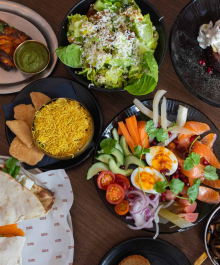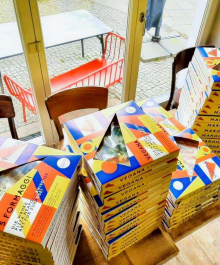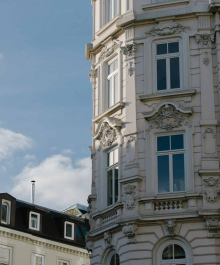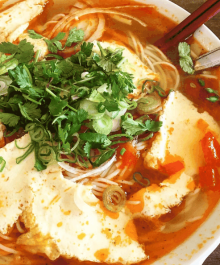
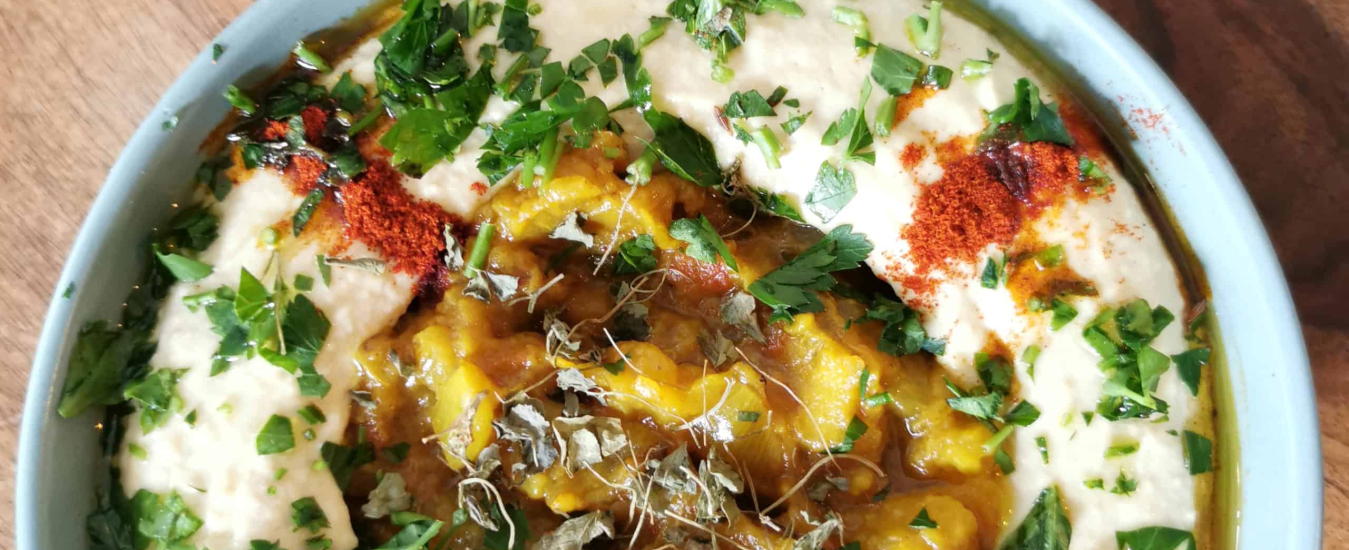
Akkawy is quickly becoming Friedrichshain’s favourite hummus place. And it’s not only because of the owner’s emerald eyes.
Working mainly with Israelis – as I do in my other life – has its upsides. One is that you’re very quickly introduced to all the best hummus restaurants in the city.
Early this year, I was introduced to one such place – and in Friedrichshain, an area with Arabic Imbisses on tap but no real, solid, official destination for hummus. Now it does. It’s called Akkawy.
Now, hummus is not my absolute favourite dish *gasp*. It’s better than guacamole or other hyped dippy-spready things but is it really much better than decent mashed potato? I neither love it nor hate it, will eat it gladly but won’t base a religion around it.
But what I do love, and what Akkawy does brilliantly, is the simple act of eating this type of food. Sharing plates with friends, breaking bread, passing things around, tasting something new and moving on. A dance as old as time. The magic of this cuisine is the act of eating itself. Of communion. Of feasting.
I’ve been to Akkawy often. I take friends there when they visit. I even write blog posts about it (meta, eh?). Is it a suppressed love for hummus that causes me to do this? Or is it, maybe, owner Julian’s eyes. Azure as a Mediterranean coastline, they shimmer with a vitality that could return life to the Dead Sea.
Julian is a Palestinian, from the ancient city of Acre (Akkawy means ‘from Acre’). His hummus-making credentials include working in Acre’s best, most prestigious and beloved hummus restaurants. The hummus he makes – that he’s perfected, he claims – is the true hummus of Acre.
It’s smoother, the tahini heavier, highlighting the subtle sweetness of the chickpeas against that sesame bitter. Not garlic-heavy, it enhances the dishes its served with instead of overpowering them. His hummus recipe is done, complete, unchangeable – according to Julian. This means it’s the dishes Akkawy serves where Julian gets to experiment.
This experimentation comes in the form of Akkawy’s use of Indian spices, seasonings and techniques. The best example of this would be their mushroom-hummus dish. The least ‘traditional’ of their dishes, it pairs mushrooms with the sweet-sour tang of tamarind and is – in Julian’s opinion – their signature dish.
When I was there, however, we ordered hummus with crisp, pickled beetroot, hummus with a sweet aubergine puree, Zahra (a creamy, baked cauliflower dish with onions, Indian spices and lashings of tahini), Shakshuka (a rich, lightly-spiced, almost smokey tomato-based sauce, baked with an egg), the classic Fatush salad and a refreshingly spicy (actually damn hot) chilli dipping sauce.
Now, this is what I was talking about earlier. That moment when you and your friends are presented with all this. The colours and smells, the different bowls, plates and dishes, the mixed, merging and changing textures… that’s when this cuisine comes to life for me.
The thread that binds all of Akkawy’s dishes is the use of tahini. That bitter tahini taste is ever-present, drawing all these diverse dishes together and making them work in concert. It’s Lebanese tahini that Akkawy uses – the best Julian has ever found and something he prizes over all those tahinis available in Palestine. Its bitter note is often offset, accented and elevated by fresh herbs and the floral notes of Za’atar, a middle-Eastern herb related to oregano. It’s never overpowering or overused.
Textures play an important role in Akkawy’s cooking. From the satisfyingly-sour crunch of the pickled beetroot, the crisp bite of fried flatbread, the contrast of egg yolk and white or the simple pleasure of a perfect salad, these textures are the main counterpoint to that endlessly-smooth hummus. A hummus so smooth you don’t even need teeth to eat it.
Soon though, all that hummus cement had started to set. Eating too much hummus… it feels like drowning. A tahini waterboard adventure that leaves you stationary, stoic and regretful. Thankfully, Julian brought over some deliciously sweet and sour homemade tamarind and cane-sugar lemonades to aid with our digestions. They helped… just.
The walk home helped, too. Not eating till the following day was also good. But, all-in-all, it was worth it. Because I got to feast with my friends, break bread together, share dishes I’d normally not order for myself and experience many new flavours.
Perhaps I’m coming around to the idea of hummus, after all.
Akkawy
Kopernikusstraße 8
10245 Berlin

